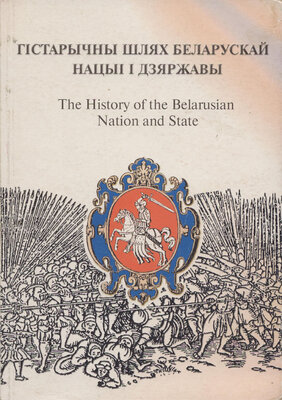Гістарычны шлях нацыі і дзяржавы
Радзім Гарэцкі, Міхась Біч, Уладзімір Конан
Выдавец: Беларускі кнігазбор
Памер: 348с.
Мінск 2001
Mass deportation was applied to many other groups of the Belorussian population in addition to those accused of disloyalty to the Soviet regime during the German occupation. Persons who had refused to assist Soviet partisans during the war were punished with special severity.
This savage repression was dictated by the need to remove from the frontier areas of the Belorussian SSR elements considered unreliable by the MVD and potential antagonists of the regime. The number of Belorussians affected is difficult to establish. One student of the subject writes:
After the liberation there was a major purge of collaborationists, nationalists, and even of neutrals (cosmopolitans) who were suspected of insufficient loyalty. How many thousand people (some assert that the number reached millions) were arrested and deported, will perhaps never be established, but even the ordinary person who had worked as a carpenter for the Germans was sentenced to three years of imprisonment. There have been various reports of the mass deportation of local persons suspected of disloyalty to the Soviets.
In addition to deportations, other steps were taken aimed at the dismemberment of the Belorussian nation. By agreement with the Soviet government, a Polish State Repatriation Administration was organized in 1944, with the function of organizing resettlement behind the Curzon Line of Poles from Western Belorussia. In November 1944 TASS reported that the first convoys of resettlers on their way to Poland were leaving Baranavicy, Hrodna, Stoupcy, and Vahkavysk. Resettlement was fairly successful for the first two years. It gave Belorussian Roman Catholics an opportunity to leave Soviet Belorussia in the guise of Poles, because no proof of nationality was demanded other than membership in the Roman Catholic Church. Often Orthodox Belorussians, particularly in the case of families whose
members were of two faiths, called themselves Roman Catholic in order to reach «democratic» Poland. When it became clear that Poland was becoming Sovietized at an increasing rate, and consequently the hope of escaping from Bolshevik oppression faded away, the Belorussian Roman Catholics refused to leave their homes. Of 740,945 persons registered to leave for Poland, only 390,513 actually left.
Of those who left only 10% were city dwellers, the rest were peasants, that is, largely Belorussians, the Polish settlers, administrators, and clergy who had been sent from Poland to Western Belorussia had either gone back to Poland or had been arrested and deported in 1939.
In 1945 an agreement was signed between the pro-Soviet Polish government sitting in Lublin and the Soviet Union, under which the Curzon Line was recognized as the frontier between Poland and the BSSR, with a few changes in favor of Poland. It is estimated that in 1956 there were 691,000 Belorussians in the districts thus transferred to Poland, of whom 133,000 were resettlers from the Western oblasts of the BSSR. Thus, territory with a Belorussian population of over half a million had been alienated from Belorussia for political reasons and transferred to Poland.
Despite the great shortage of labor in the factories and particularly on the kolkhozes in Belorussia, accelerated deportations from Belorussia began in 1954 of families who were sent to work in the timber industry in Karelia and in even greater numbers to work in the virgin lands in Siberia and Kazakhstan. The Main Resettlement Administration of the Kazakh SSR reported that in 1954-55, 22,000 familes of kolkhozniks, factory workers, and employees were resettled from Ukraine, Belorussia, and Moldavia. In 1955 special trains began to operate on the Minsk-Pavlodar route to carry Belorussians to the virgin lands. Izvestia reported on January 20, 1955, that 20,000 young men and women from Belorussia were ready to leave for the virgin lands. The Belorussian newspaper Zviazda, published in Minsk, reported on April 29, 1955, that during this same period more than one hundred doctors, nursing orderlies, dentists, and midwives had also left Belorussia for the virgin lands
The newspaper Sovetskaya Belorussiya stated on May 30, 1956, that the Central Committee of the Belorussian Komsomol had received 7,000 applications from young people asking for transfer to building sites in the North and East. Belorussia is, accordingly, a main source of emigrant labor, although in Belorussia itself immense areas of well-drained and highly fertile land remain unused. «According to statistics of the Ministry of Amelioration of the Belorussian SSR, more than 190,000 hectares of drained peat land are not being used. In one year the Belorussian kolkhozes could have obtained not less than 10 million additional poods* of grain,» says Pravda.
The postwar resettlement and other forms of oppression of the Belorussian people constitute grounds for the assertion that such measures are aimed at rendering the Belorussian people powerless by depriving them of their intellectuals and removing their youth to the virgin lands and to the sites of construction projects. While in 1940, according to official Soviet sources, the population of Belorussia was 9.2 million, in 1956 it numbered only 8 million. The Soviet regime, throughout the entire period of its rule in Belorussia, has carried out a persistent campaign of genocide against the Belorussian people, on the most varied pretexts.
(Byelorussian Statehood. Reader and Bibliography. New York, 1988. P.p. 229—241)
* A pood equals 16.38 kilograms or 36 lb. avoirdupois.
СТАТУТ РАДЫ БЕЛАРУСКАЕ ІІАРОДНАЕ РЭСПУБЛІКТ*
( Фрагмент)
I. Паўнамоцтвы, мэты й заданыгі
Пар. 1. Рада Беларускае Народнае Рэспублікі (БНР) — найвышэйшая ўстанова й адзінае праўнае прадстаўніцтва сувэрэнных правоў беларускага народу, выяўленых у праватворчым Акце 25 Сакавіка 1918 г., зафіксаваным 3-й Устаўной Граматай БНР.
Пар. 2. Правы Рады БНР вынікаюць зь неабмежаваных паўнамоцтваў, дадзеных ёй Усебеларускім Зьездам (Кангрэсам) як свайму найвышэйшаму органу — Радзе Зьезду 31 сьнежня 1917 г. і перададзеных апошнім вышэйшым пэрсанальным носьбітам гэтых паўнамоцтваў, старіцынём Рады БНР Васілём Захаркам, тэстамэнтальна Міколу Абрамчыку, зь ініцыятывы якога на грунце гэтага аднавілася дзейнасьць Рады БНР у экзылі ў сьнежні 1947 г.
Пар. 3. Паўнамоцтвы гэтыя трываюць, згодна з пастановай Усебеларускага Зьезду (Кангрэсу) 1917 г., да часу вольных выбараў Устаноўчага Сойму ў незалежнай БНР.
Пар. 4. Аснаўная мэта й заданьне Рады БНР — перахаваньне й выкананьне волі беларускага народу, выказанай у Акце 25 Сакавіка 1918 году, а гэта — адбудова незалежнай беларускай дзяржаўнасыді на ўсіх беларускіх землях усімі магчымымі й даступнымі спосабамі й дарогамі.
Пар. 5. Выкананьне заданьняў Рады БНР рэалізуецца праз дзейнасьць ейных органаў, да якіх належаць:
1. Сэсія Рады БНР;
2. Прэзыдыюм Рады БНР з Старшынём Рады БНР;
3. Сакратарыят Рады БНР;
4. Кантроль Рады БНР;
5. Суд Рады БНР.
ЗВАРОТ БЕЛАРУСАЎ ЗАМЕЖЖА, УДЗЕЛЬНІКАЎ ІІЕРШАГА З’ЕЗДА БЕЛАРУСАЎ СВЕТУ
Беларускі народзе!
Мы, твае сыны і дочкі, разьнесеныя па цэлым шырокім сьвеце вятрамі нядолі, што напаткала наш край, зьехаліся з Поўначы і Паўдня, з Усходу і Захаду ў сталіцу суверэннай Беларускай Дзяржавы — Менск, каб удыхнуць гаючае паветра роднай зямлі, наталіць вочы лагоднымі беларускімі краявідамі, сустрэцца з дарагімі сэрцу сваякамі і суродзічамі, адчуць цеплыню іхных душаў. У лучнасці з Бацькаўшчынай, гэтай жыватворнай духовай крыніцай, тоіцца сакрэт нашага супольнага выжывання, вытрываласці да перамогі над усімі цяжкасьцямі і перашкодамі на шляху да свабоды і дабрабыту.
Божай воляй мы дачакаліся часу, калі можам зьязджацца з цэлага сьвету ў цудоўны край свайго паходжання, на свае вочы аглядаць яго, адчуваць пульс ягонага
* Прыняты на 11-й сэсіі Рады БНР 29 траўня 1971 г.
жыцьця, разам цешыцца і разам хвалявацца ды супольнымі намаганнямі шукаць выйсьця зь няпростага становішча.
Мы ганарымся і радуемся, што Беларусь узышла на шлях нацыянальна-дзяржаўнага будаўніцтва. Мы шчасьлівыя, што Бацькаўшчына ізноў сталася арганічнай часткай нашага быту, мрояў, надала большага сэнсу і мэтанакіраванасьці нашым намаганьням. У гэтай супольнасьці — зарука таго, што эканамічная і культурная адбудова беларускай дзяржаўнасьці будзе ісці далей.
Мы заклікаем усіх вас, дарагія Суродзічы, да веры ў Беларусь, да патрыятызму, да дзеяньняў у імя свабоднай дэмакратычнай Беларускай Дзяржавы. Вера ў свой народ, у ягоныя здольнасьці, у лепшую яго будучыню — гэта вялікая стваральная сіла. У гэтым пераканаліся мы, пражыўшы дзесяцігодзьдзі на чужыне з думкамі пра Родны Край. Вера ў саміх сябе, у тое, што з намі Бог, дапаможа нам і цяпер, калі мы разам, супольнымі сіламі выйдзем на шырэйшыя шляхі ў лепшую будучыню.
Жыве Беларусь!
г. Мінск, 8—10 ліпеня 1993 г.
ЗВАРОТ ПЕРІПАГА З’ЕЗДА БЕЛАРУСАЎ СВЕТУ ДА БЕЛАРУСКАГА НАРОДА
Браты і сёстры!
Доўгія і складаныя пуцявіны вялі да паяднання беларускай нацыі, воляю лёсу раскіданай у свеце. Амаль усе еўрапейскія народы ўжо даўно перажылі сваё станаўленне ў якасці нацыянальнага адзінства. Перамогі і страты згуртавалі іх, умацавалі іх сілу і волю ў імкненні да самастойнага жыцця. Беларусы ж усё яшчэ пакутуюць на раздарожжы свайго гістарычнага шляху.
Але надышоў час вырашаць свой лёс. Цяпер альбо ніколі! Беларусь атрымала гістарычны шанц набыць рэальную дзяржаўнасць, самастойнасць, поўны суверэнітэт. I гэты шанц неабходна выкарыстаць.
Мы павінны мабілізаваць усе сілы, каб не толькі адстаяць першыя поступы дэмакратыі, незалежнасці, нацыянальнага адраджэння, але і рушыць далей, да вялікіх, зорных здзяйсненняў — адбудовы агульнага Беларускага Дому. Гэту высокую, наканаваную Богам місію мы здолеем выканаць толькі тады, калі адбудзецца ўсенароднае адбуджэнне да свядомага нацыянальнага жыцця, калі вернем сабе гістарычную памяць, якую ў нас адбіралі цэлыя стагоддзі, глыбока ўсвядомім, хто мы ёсць і кім павінны быць у гэтым свеце. Мы можам ажыццявіць гістарычную справядлівасць і назаўсёды замацаваць незалежную Беларусь на карце Еўропы не як геаграфічнае паняцце, а як шанаваную, паўнавартасную дзяржаву беларускага народа і іншых народаў, што здаўна жывуць на нашай зямлі.
 КНІГІ ОНЛАЙН
КНІГІ ОНЛАЙН


